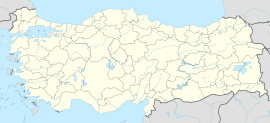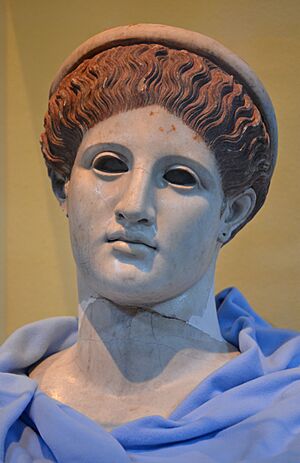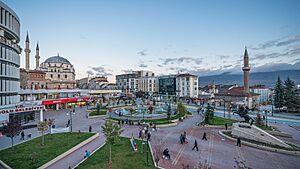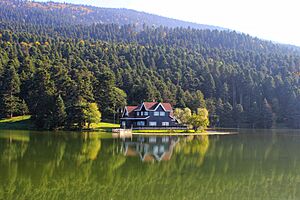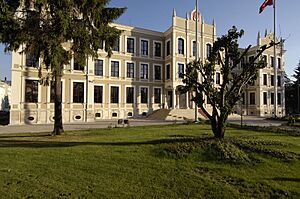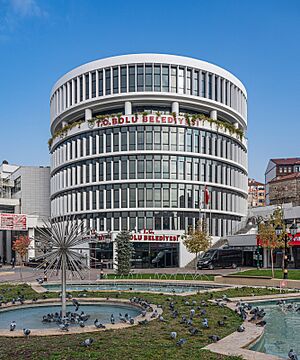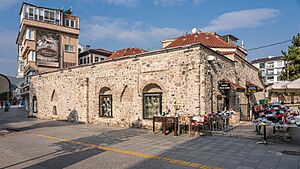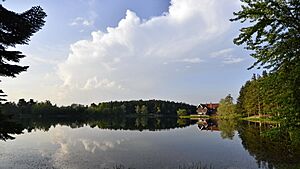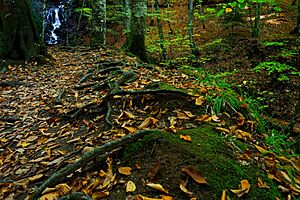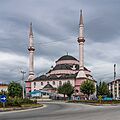Bolu facts for kids
Quick facts for kids
Bolu
|
|
|---|---|
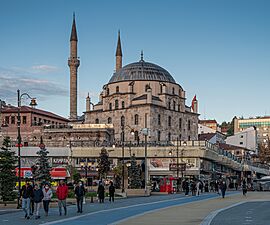
Beyazıt Mosque in Bolu city center
|
|
| Country | Turkey |
| Province | Bolu |
| District | Bolu |
| Elevation | 726 m (2,382 ft) |
| Population
(2021)
|
184,682 |
| Time zone | TRT (UTC+3) |
Bolu is a city in northern Turkey. It is the main city of the Bolu Province and Bolu District. Bolu is located on the important highway between Istanbul and Ankara.
In 2021, about 184,682 people lived in Bolu. The city is led by mayor Tanju Özcan, who was elected in 2019. Bolu was once known as Claudiopolis in ancient times. It was also called Eskihisar, meaning "old fortress."
Bolu is about 742 meters (2,434 feet) above sea level. The old highway, called D-100, goes over Mount Bolu. A newer, faster motorway (E-80) now passes through the Mount Bolu Tunnel, which is a bit further from the city.
Contents
Bolu's Past
Ancient Times to the Seljuk Turks
Bolu has a very long history. Around 2000 BC, it was part of one of the Hittite kingdoms. Later, around 500 BC, it became a major city in the Greek Kingdom of Bithynia. This kingdom lasted from 279 BC to 79 BC.
Many different groups of people lived in this area in ancient times. The Greek writer Strabo mentioned a town called Bithynium. It was famous for its good pastures and cheese.
During the Ancient Roman era, the town was called Claudiopolis. This name came from Emperor Claudius. Bolu was the birthplace of Antinous, a close friend of the Roman Emperor Hadrian. Emperor Hadrian was very kind to the city.
Later, Emperor Theodosius II made Bolu the capital of a new province called Honorias. This was named after his son, Honorius.
Under Byzantine rule, the city was known as Hadrianopolis. In the 11th century, after a big battle, Turkmens settled in the city. They called it Boli, which was a shorter version of the Greek word for "city." The Byzantines took it back in 1097. However, the Seljuk Sultanate of Rum conquered it in 1197.
The Ottoman Era
In 1325, the Ottoman Empire took control of Bolu. This happened under Orhan Ghazi. The city then became known by its current Turkish name, Bolu.
For a short time, between 1402 and 1423, it was also ruled by the Candaroğlu family. Bolu became an important town in the Ottoman Empire. It was the main town of a region called a sanjak. In the late 1800s and early 1900s, Bolu was part of the Kastamonu Vilayet province.
Fun Places to Visit
The area around Bolu is great for outdoor activities like walking. There are hotels in the city for visitors. Here are some interesting places to see:
- The Yıldırım Bayezid Camii, a grand mosque built in the 14th century.
- The Bolu Museum, which has ancient items from different time periods.
- The Kaplıcalar, which are natural hot springs.
- Lake Abant and the village of Gölköy, close to the university.
- The famous volcanic crater lake called Gölcük.
- The shrine of Hayreddin-i Tokadi, a local saint. People visit his shrine during festivals and holidays.
- Yedigöller National Park, a beautiful park with seven lakes.
- The Aslahaddin Mosque, where an early Muslim hero is buried.
- The old ruins of the ancient stadium of Claudiopolis.
Bolu's Culture
Buildings and Sights
Bolu has many examples of Ottoman architecture. The Bayezid Grand Mosque was originally built by Bayezid the Thunderbolt. It was rebuilt in 1899 by Sultan Abdul Hamid II. The mosque has beautiful decorations that look like embroidery.
The Kadı Mosque is a great example of classic Ottoman design. It was built in 1499. Its entrance has detailed wooden carvings. Other Ottoman mosques in Bolu include the İmaret Mosque (16th century) and the Saraçhane Mosque (1750).
The remains of the ancient city of Bithynium can be found on four hills in Bolu. On Hıdırlıktepe, a tomb and parts of an old theater have been found. On Hisartepe, a temple believed to be built by Emperor Hadrian was discovered.
The Bolu Museum opened in 1975. It shows and protects old items found in the Bolu area. It has thousands of archaeological items from the Stone Age to the Byzantine era. It also displays items that show the local culture and history.
Local Food
Bolu has some special local foods. One is a sweet treat made from hazelnuts, which grow a lot here. They also have a special scent called "eau-de-cologne" that smells like grass. A unique thing about Bolu is its soft spring water, called kökez suyu, which comes from fountains in the city.
Media
Bolu has 12 local newspapers. It also has two local TV channels (Köroğlu TV and Abant TV). There are three local radio stations and six local magazines.
Bolu's Economy
Bolu is a busy market town. It has a long shopping street and is surrounded by beautiful forested mountains. Students from the local university and soldiers based in Bolu help the local economy.
Traditionally, the economy relied on forestry and handmade goods. Monday is market day, when people from nearby villages come to town to shop.
The main road from Istanbul to Ankara used to go over Mount Bolu. Many travelers would stop at roadside restaurants. Now, with the Mount Bolu Tunnel open, most people use the faster motorway. This means fewer people stop in Bolu, especially in winter when the mountain road can be closed due to snow.
Bolu's Weather
Bolu has a climate that is a mix of oceanic and humid continental. This means it has cold, snowy winters and warm summers with cool nights. Bolu is often cloudy and foggy. It gets about 1,800 hours of sunshine each year. Some parts of the province, like Gerede, have even colder winters than the city center.
The highest temperature ever recorded in Bolu was 42.8°C (109.0°F) on August 15, 2023. The lowest temperature ever recorded was -31.5°C (-24.7°F) on January 5, 1942.
| Climate data for Bolu (1991–2020, extremes 1929–2023) | |||||||||||||
|---|---|---|---|---|---|---|---|---|---|---|---|---|---|
| Month | Jan | Feb | Mar | Apr | May | Jun | Jul | Aug | Sep | Oct | Nov | Dec | Year |
| Record high °C (°F) | 19.8 (67.6) |
24.1 (75.4) |
29.3 (84.7) |
31.8 (89.2) |
34.6 (94.3) |
37.0 (98.6) |
39.3 (102.7) |
42.8 (109.0) |
38.5 (101.3) |
34.4 (93.9) |
27.0 (80.6) |
23.5 (74.3) |
42.8 (109.0) |
| Mean daily maximum °C (°F) | 5.8 (42.4) |
8.1 (46.6) |
11.8 (53.2) |
17.1 (62.8) |
21.9 (71.4) |
25.3 (77.5) |
28.2 (82.8) |
28.7 (83.7) |
25.0 (77.0) |
19.7 (67.5) |
13.5 (56.3) |
7.6 (45.7) |
17.7 (63.9) |
| Daily mean °C (°F) | 1.1 (34.0) |
2.5 (36.5) |
5.4 (41.7) |
9.9 (49.8) |
14.5 (58.1) |
17.9 (64.2) |
20.5 (68.9) |
20.7 (69.3) |
16.6 (61.9) |
12.2 (54.0) |
6.9 (44.4) |
2.9 (37.2) |
10.9 (51.6) |
| Mean daily minimum °C (°F) | −2.4 (27.7) |
−1.6 (29.1) |
0.6 (33.1) |
4.2 (39.6) |
8.5 (47.3) |
11.7 (53.1) |
14.0 (57.2) |
14.2 (57.6) |
10.7 (51.3) |
7.3 (45.1) |
2.4 (36.3) |
−0.6 (30.9) |
5.8 (42.4) |
| Record low °C (°F) | −31.5 (−24.7) |
−25.8 (−14.4) |
−19.8 (−3.6) |
−11.5 (11.3) |
−2.3 (27.9) |
0.0 (32.0) |
2.8 (37.0) |
1.4 (34.5) |
−2.5 (27.5) |
−5.8 (21.6) |
−24.8 (−12.6) |
−29.1 (−20.4) |
−31.5 (−24.7) |
| Average precipitation mm (inches) | 55.6 (2.19) |
50.6 (1.99) |
56.2 (2.21) |
52.8 (2.08) |
64.2 (2.53) |
68.9 (2.71) |
28.4 (1.12) |
27.4 (1.08) |
26.5 (1.04) |
48.5 (1.91) |
40.4 (1.59) |
54.1 (2.13) |
573.6 (22.58) |
| Average precipitation days | 15.53 | 14.67 | 15.73 | 13.2 | 14.2 | 12.73 | 6.17 | 5.73 | 7.63 | 10.7 | 11.2 | 15.57 | 143.1 |
| Average relative humidity (%) | 81.5 | 77.6 | 73.9 | 71 | 72.9 | 73.7 | 70.5 | 70.1 | 72.4 | 76.9 | 77.3 | 81.5 | 74.9 |
| Mean monthly sunshine hours | 52.7 | 76.3 | 117.8 | 156.0 | 198.4 | 225.0 | 260.4 | 251.1 | 186.0 | 127.1 | 90.0 | 52.7 | 1,793.5 |
| Mean daily sunshine hours | 1.7 | 2.7 | 3.8 | 5.2 | 6.4 | 7.5 | 8.4 | 8.1 | 6.2 | 4.1 | 3.0 | 1.7 | 4.9 |
| Source 1: Turkish State Meteorological Service | |||||||||||||
| Source 2: NOAA NCEI(humidity) | |||||||||||||
Famous People from Bolu
- Alexandru Callimachi (1737–1821), a prince from Moldavia.
- Antinous (around 111 - 130 AD), a friend of Roman Emperor Hadrian. After he died, he was honored like a god.
- Köroğlu, a legendary hero from Turkish folklore.
Images for kids
-
Bolu Yukarı Taş Han, an old inn.
See also
 In Spanish: Bolu para niños
In Spanish: Bolu para niños
 | Janet Taylor Pickett |
 | Synthia Saint James |
 | Howardena Pindell |
 | Faith Ringgold |


